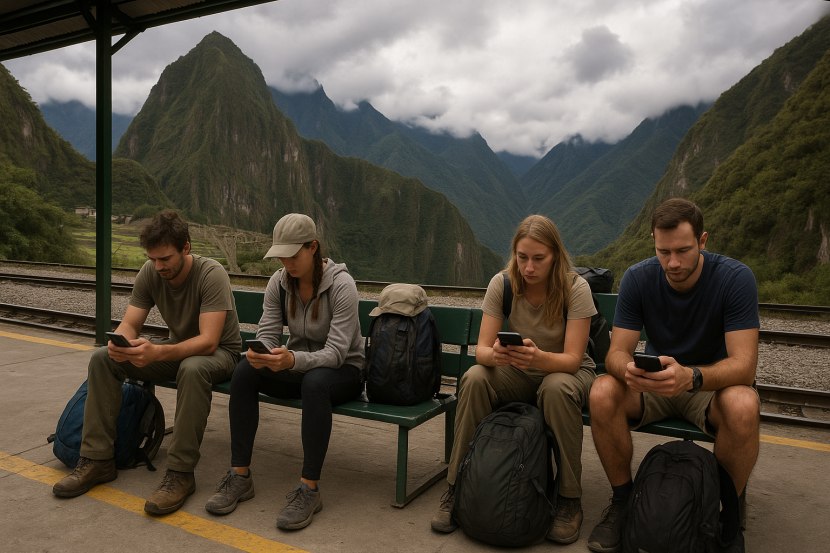Published on
September 22, 2025
Machu Picchu, one of the most iconic landmarks in Peru, has recently been thrust into chaos, as protests disrupt local transport and leave many tourists stranded. Much like the recent nationwide strikes in France that have paralyzed public transport and shut down museums, the chaos in Peru has highlighted how civil unrest can leave tourists stranded and vulnerable to local issues. A combination of political and economic tensions in the region has created an unsettling situation for those visiting the historic site, known for its awe-inspiring views and ancient ruins.
Mexico: Cultural Clashes
In Mexico, protests have been taking place against gentrification, particularly in Mexico City. The protests began in July 2025 and have continued, with demonstrators expressing anger over rising rents and the displacement of local residents. Some protests have been marked by anti-American slogans and xenophobic acts, though some protest leaders deny this.
France on Edge
France experienced a major day of nationwide strikes and protests on September 18, 2025, involving hundreds of thousands of people. The demonstrations, led by trade unions, were in response to the new prime minister, Sébastien Lecornu, and his government’s proposed budget cuts and austerity plans. The protests affected public services, including schools, hospitals, and public transport. The unrest comes at a time of political crisis for France, with the appointment of Lecornu as the third prime minister in a year after his predecessor lost a vote of confidence over an unpopular budget.
Spain: Rallying for Gaza
Pro-Palestinian protests have been a significant source of disruption in Spain. On September 14, 2025, a protest in Madrid as a large number of people interrupted the final stage of the Spanish Vuelta cycling race, forcing its early conclusion. The protesters were demonstrating against the participation of the Israeli-owned Israel Premier Tech cycling team. The event led to political clashes between the leftist government and the right-wing opposition. Additionally, thousands of people took part in pro-Palestine rallies across Spain on September 18, chanting slogans and expressing support for the Gaza-bound Global Sumud Flotilla.
Brazil: Mass Mobilization Against Amnesty for Former President Bolsonaro
In Brazil, tens of thousands of people have taken to the streets to protest against granting amnesty to former president Jair Bolsonaro, who was recently convicted and sentenced to 27 years in prison for his role in a coup plot. The protests, which are the largest pro-democracy demonstrations in years, were organized by a number of prominent artists and musicians. The protests were also a reaction to a recently passed constitutional amendment that would make it more difficult to charge or arrest lawmakers.
Protests Spark Chaos in Aguas Calientes
In a move that has sparked outrage, the Peruvian government allowed the contract of Consettur, a longstanding bus operator, to expire. This decision opened the door for a new company, based in a neighboring district, to take over the transportation services. The changes have led to protests by the residents of Aguas Calientes, a town that serves as the gateway to Machu Picchu.
Locals, who rely heavily on tourism for their livelihoods, have expressed concerns over the shift in tourism concessions, demanding more transparency and fairness in the allocation of such contracts. The protests quickly escalated, with protesters blocking critical transportation routes and disrupting train services operated by PeruRail.
Stranded Tourists Await Evacuation
The protests, which involved blocking train tracks with rocks and even digging up parts of the railway, led to the suspension of PeruRail services. As a result, hundreds of tourists found themselves trapped in Aguas Calientes, unable to return to Cusco or other destinations in Peru.
While more than 1,400 tourists were evacuated earlier in the week, around 900 were still stranded at the site, with limited access to transportation. Fortunately, the region’s breathtaking landscapes and natural beauty provided some solace to those waiting for assistance.
Tourism’s Economic Impact in Peru
Tourism plays a critical role in the Peruvian economy, and Aguas Calientes is no exception. The town’s economy depends largely on the influx of visitors to Machu Picchu, with businesses ranging from hotels to restaurants all relying on tourist dollars. As such, the disruption caused by the protests has not only affected tourists but has also had a ripple effect on local businesses.
Local leaders have called for a resolution to the situation, emphasizing the importance of maintaining a stable and fair environment for tourism. They argue that the current unrest could threaten the area’s economic stability, as tourists may begin to reconsider visiting Machu Picchu if transport services continue to be unreliable.
Global Attention and Threats to Machu Picchu’s Status
Machu Picchu, one of the “New7Wonders” of the World, is a UNESCO World Heritage Site that attracts millions of visitors each year. However, the ongoing protests have raised concerns about the long-term impact on the site’s reputation. The organization behind the New7Wonders title has warned that continued disruptions could tarnish Machu Picchu’s standing as a global tourist destination.
Despite the protests, many tourists are still hopeful for a swift resolution, with some expressing their determination to experience the wonders of Machu Picchu once the situation stabilizes. The region’s stunning beauty continues to draw travelers from all corners of the globe, and many remain optimistic that the protests will not overshadow the magnificence of the site itself.
Looking Ahead: What Tourists Can Expect
For those planning to visit Machu Picchu in the near future, it is important to stay informed about the situation in the region. Authorities are working to resolve the issue and restore transportation services. In the meantime, tourists are advised to stay updated through official channels and consider alternative routes or travel dates if possible.
In the face of these disruptions, it remains clear that Machu Picchu holds an undeniable appeal for travelers. The site’s rich history, cultural significance, and breathtaking scenery continue to make it a must-see destination. However, the recent protests highlight the importance of stable infrastructure and fair tourism policies to ensure the long-term sustainability of such iconic landmarks.
